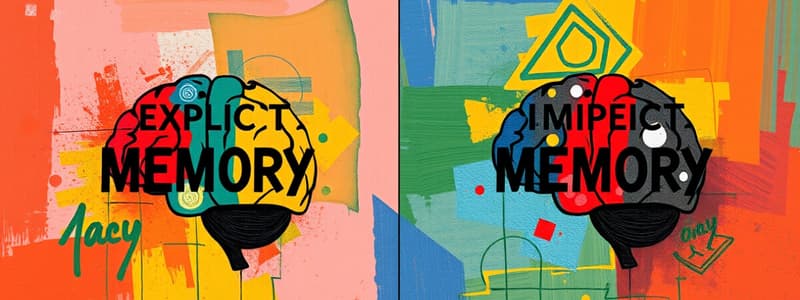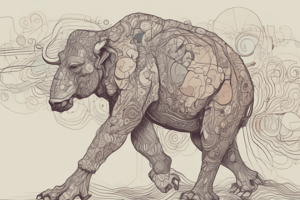Podcast
Questions and Answers
What type of memory is characterized by conscious recollection of facts and experiences?
What type of memory is characterized by conscious recollection of facts and experiences?
- Episodic memory
- Procedural memory
- Declarative memory (correct)
- Implicit memory
Which of the following best describes implicit memory?
Which of the following best describes implicit memory?
- Memory that can be verbally expressed
- Unconscious associations and experiences (correct)
- Memory related to conscious recollection
- Immediate recall of information
What type of memory involves the gradual learning of motor skills without conscious awareness?
What type of memory involves the gradual learning of motor skills without conscious awareness?
- Semantic memory
- Procedural memory (correct)
- Explicit memory
- Episodic memory
How does priming facilitate memory retrieval?
How does priming facilitate memory retrieval?
Which type of memory is primarily responsible for storing general knowledge and facts?
Which type of memory is primarily responsible for storing general knowledge and facts?
Which scenario best illustrates the impact of classical conditioning on implicit memory?
Which scenario best illustrates the impact of classical conditioning on implicit memory?
Which behavior is least likely influenced by implicit memory systems?
Which behavior is least likely influenced by implicit memory systems?
What distinction is made between implicit and explicit memory in terms of neuroanatomical structures?
What distinction is made between implicit and explicit memory in terms of neuroanatomical structures?
What phenomenon can lead to false memories due to misleading information after an event?
What phenomenon can lead to false memories due to misleading information after an event?
Which of the following factors can influence the accuracy of eyewitness testimony?
Which of the following factors can influence the accuracy of eyewitness testimony?
What aspect of flashbulb memories is often overestimated according to research?
What aspect of flashbulb memories is often overestimated according to research?
What were researchers Talarico and Rubin investigating in their study on memory?
What were researchers Talarico and Rubin investigating in their study on memory?
In the studies conducted by Conway et al. (2009), what was primarily measured?
In the studies conducted by Conway et al. (2009), what was primarily measured?
What concept describes the confusion about the source of a memory?
What concept describes the confusion about the source of a memory?
Which mechanism is suggested to be involved in the formation of flashbulb memories?
Which mechanism is suggested to be involved in the formation of flashbulb memories?
What is a common misconception about individuals' confidence in flashbulb memories?
What is a common misconception about individuals' confidence in flashbulb memories?
Flashcards are hidden until you start studying
Study Notes
Memory Types
- Explicit Memory: Conscious, declarative knowledge, encompassing episodic (personal experiences) and semantic (facts and general knowledge) memory.
- Implicit Memory: Unconscious, nondeclarative knowledge, including procedural (motor skills and habits) and classical conditioning (behavioral responses).
Implicit Memory Mechanisms
- Associative Learning: Unconscious links between stimuli, e.g., dental drills associated with anxiety.
- Priming: Activation of related concepts in memory, demonstrated through word associations (e.g., "money, withdraw, robbery").
Procedural Memory
- Non-verbalizable knowledge of how to perform tasks, acquired gradually through experience rather than single instances.
Memory Performance Distinctions
- Implicit and explicit memory show different performance levels due to:
- Processing Levels: Depth of encoding affects memory retention.
- Modality/Format: Memory performance can vary based on cues like font or case.
- Retention Interval: Time between learning and recall influences memory accuracy.
- Amnesic Patients: Differences in memory function can highlight dissociations between implicit and explicit systems.
Neuroanatomical Structures
- Different memory systems may be supported by unique neuroanatomy, especially for declarative vs procedural memory.
False Memory
- Influenced by misleading information post-event, evident in eyewitness testimony (Loftus, 1974).
- Schema and Scripts: Memories can be distorted to fit existing cognitive frameworks.
- Source Confusion: Difficulty distinguishing the origin of memories exacerbated by social pressures.
Flashbulb Memories
- Vivid recollections of significant events, prompting questions about accuracy and retention (Brown & Kulik, 1977).
- Rehearsal Effect: Frequent recollection may contribute to perceived accuracy over time.
- Neisser’s study of Pearl Harbor emphasized the decay of flashbulb memories, paralleling other memories.
Research Insights
- Talarico and Rubin (2003): Flashbulb memories decline in detail consistency at the same rate as everyday memories over time, indicating no greater accuracy.
- Study comparing flashbulb memories of 9/11 demonstrated similar patterns of decay in vividness and reliability as regular memories.
Conway et al. Findings (2009)
- Survey of 678 participants about memories of the September 11 attacks, with follow-up surveys revealing changes in recollection and confidence over time, supporting the view that flashbulb memories are not immune to decay.
Studying That Suits You
Use AI to generate personalized quizzes and flashcards to suit your learning preferences.



